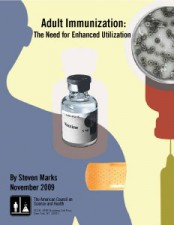 Immunization against vaccine preventable diseases is one of the most important and beneficial public health measures available. However, utilization rates among adults remain low, well below Department of Health and Human Services target levels.
Immunization against vaccine preventable diseases is one of the most important and beneficial public health measures available. However, utilization rates among adults remain low, well below Department of Health and Human Services target levels. Immunization against vaccine preventable diseases is one of the most important and beneficial public health measures available. However, utilization rates among adults remain low, well below Department of Health and Human Services target levels. Nearly 50,000 adults die each year in the U.S. from one of the 10 vaccine preventable diseases identified by the Advisory Committee on Immunization Practices of the Centers for Disease Control and Prevention.
Immunization against vaccine preventable diseases is one of the most important and beneficial public health measures available. However, utilization rates among adults remain low, well below Department of Health and Human Services target levels. Nearly 50,000 adults die each year in the U.S. from one of the 10 vaccine preventable diseases identified by the Advisory Committee on Immunization Practices of the Centers for Disease Control and Prevention.
Each year, the direct (medical) and indirect (lost productivity) costs of influenza alone top $87 billion, while medical expenditures and productivity losses associated with hepatitis B reach $700 million. The barriers to adult immunization are high and involve a number of financial, informational, and operational obstacles.
Vaccines are now available to prevent the most common diseases, including influenza, pneumococcal infections, herpes zoster, human papillomavirus, hepatitis B, and tetanus, diphtheria, and pertussis, although vaccination remains a low priority for both physicians and patients.
To address these problems, new public-private partnerships have been formed to increase awareness of the importance of immunization, and additional initiatives are under consideration to reduce the financial and operational barriers to broader vaccine delivery.
By Steven Marks, who thanks Litjen (LJ) Tan, William Schaffner, Lisa Jackson, and W. Paul Glezen, four leaders in the field of infectious diseases, who offered their time, shared their perspectives, and thus helped ensure that this report would be accurate and useful for readers.
The American Council on Science and Health gratefully acknowledges the comments and contributions of the following individuals who reviewed this work:
Bruce Gellin, M.D., MPH, Director, National Vaccine Program OfficeU.S. Department of Healthand Human Services
William Paul Glezen,M.D., Department of Microbiology and Immunology Baylor College of Medicine
Paul A. Offit, M.D., The Children’s Hospital of PhiladelphiaUniversity of Pennsylvania
William Schaffner, M.D., Professor and Chair, Dept.of Preventive MedicineVanderbilt University School of Medicine
David R. Smith, M.D., President, SUNY Upstate Medical University Prof. of Pediatrics, U.of Cincinnati College of Medicine
Raymond A. Strikas,M.D., FACP, Captain, U.S. Public Health Service National Vaccine Program Office, HHS
Litjen Tan, Ph.D., Director of Medicine and Public Health American Medical Association
ACSH accepts unrestricted grants on the condition that it is solely responsible for the conduct of its research and the dissemination of its work to the public. The organization does not perform proprietary research, nor does it accept support from individual corporations for specific research projects. All contributions to ACSH—a publicly funded organization under Section 501(c)(3) of the Internal Revenue Code—are tax deductible.
Adult Immunization: The Need for Enhanced Utilization by American Council on Science and Health on Scribd


